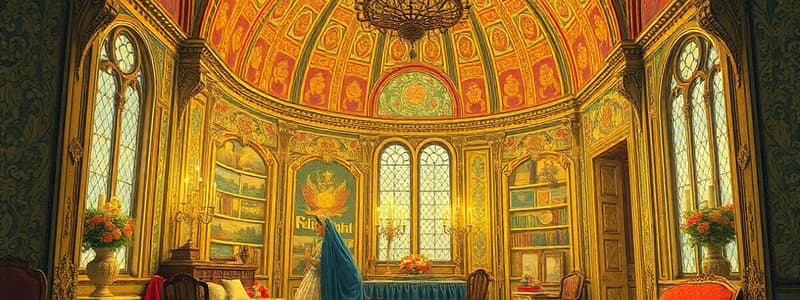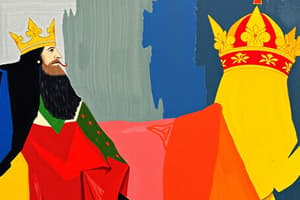Podcast
Questions and Answers
What was the primary cash crop that contributed to the wealth of Saint Domingue's landowners?
What was the primary cash crop that contributed to the wealth of Saint Domingue's landowners?
- Cotton
- Tobacco
- Sugar (correct)
- Rice
The Enclosure Movement allowed typical people increased access to farmland.
The Enclosure Movement allowed typical people increased access to farmland.
False (B)
Who was the military general that led the Haitian Revolution?
Who was the military general that led the Haitian Revolution?
Toussaint L’Ouverture
The Industrial Revolution began mainly in ________ due to its abundant natural resources.
The Industrial Revolution began mainly in ________ due to its abundant natural resources.
Match the following social classes from Saint Domingue with their descriptions:
Match the following social classes from Saint Domingue with their descriptions:
Which of the following best describes the Factory System?
Which of the following best describes the Factory System?
Capitalism involves significant government ownership of businesses.
Capitalism involves significant government ownership of businesses.
What technological advancement in agriculture allowed for more efficient farming during the Agricultural Revolution?
What technological advancement in agriculture allowed for more efficient farming during the Agricultural Revolution?
Which event was marked by the 3rd estate refusing to leave until a new constitution was formed?
Which event was marked by the 3rd estate refusing to leave until a new constitution was formed?
The Reign of Terror was primarily a time of peace and stability in France.
The Reign of Terror was primarily a time of peace and stability in France.
Who were the primary leaders during the Reign of Terror?
Who were the primary leaders during the Reign of Terror?
The Tennis Court Oath occurred after the ________ was convened to discuss the financial crisis in France.
The Tennis Court Oath occurred after the ________ was convened to discuss the financial crisis in France.
What was a significant social cause of the French Revolution?
What was a significant social cause of the French Revolution?
The Tennis Court Oath was an agreement that all estates would be taxed equally.
The Tennis Court Oath was an agreement that all estates would be taxed equally.
What were the natural rights emphasized by Enlightenment thinkers?
What were the natural rights emphasized by Enlightenment thinkers?
Match the following terms with their descriptions:
Match the following terms with their descriptions:
What was the main purpose of the Reign of Terror during the French Revolution?
What was the main purpose of the Reign of Terror during the French Revolution?
The Guillotine was initially seen as a humane form of execution during the Reign of Terror.
The Guillotine was initially seen as a humane form of execution during the Reign of Terror.
Who was the leader of the Jacobin party during the Reign of Terror?
Who was the leader of the Jacobin party during the Reign of Terror?
The _________ was a significant event where members of the Third Estate vowed to not disband until a new constitution was created.
The _________ was a significant event where members of the Third Estate vowed to not disband until a new constitution was created.
Match the following events with their significance:
Match the following events with their significance:
What event marked the end of the French Revolution?
What event marked the end of the French Revolution?
The Haitian Revolution occurred during the same time period as the French Revolution.
The Haitian Revolution occurred during the same time period as the French Revolution.
What was one major domestic policy created by Napoleon that is still used in France today?
What was one major domestic policy created by Napoleon that is still used in France today?
Flashcards
Absolutism
Absolutism
A system of government where a single ruler, usually a king or queen, holds absolute power with no checks or balances.
Divine Right
Divine Right
The belief that a ruler's right to rule comes directly from God, justifying absolute power.
Natural Rights
Natural Rights
The idea that people have inherent rights to life, liberty and property, which cannot be taken away by the government.
Philosophes
Philosophes
Signup and view all the flashcards
Estate System
Estate System
Signup and view all the flashcards
Bourgeoisie
Bourgeoisie
Signup and view all the flashcards
Estates-General Meeting
Estates-General Meeting
Signup and view all the flashcards
Tennis Court Oath
Tennis Court Oath
Signup and view all the flashcards
Enclosure Movement
Enclosure Movement
Signup and view all the flashcards
Toussaint L'Ouverture
Toussaint L'Ouverture
Signup and view all the flashcards
Crop rotation
Crop rotation
Signup and view all the flashcards
Capitalism
Capitalism
Signup and view all the flashcards
Textile Industry
Textile Industry
Signup and view all the flashcards
Factory System
Factory System
Signup and view all the flashcards
Communism
Communism
Signup and view all the flashcards
Socialism
Socialism
Signup and view all the flashcards
Storming of the Bastille
Storming of the Bastille
Signup and view all the flashcards
Women's March to Versailles
Women's March to Versailles
Signup and view all the flashcards
Flight to Varennes
Flight to Varennes
Signup and view all the flashcards
Reign of Terror
Reign of Terror
Signup and view all the flashcards
Robespierre
Robespierre
Signup and view all the flashcards
Coup d'état by Napoleon
Coup d'état by Napoleon
Signup and view all the flashcards
Continental System
Continental System
Signup and view all the flashcards
Invasion of Russia
Invasion of Russia
Signup and view all the flashcards
Study Notes
Absolutism
- Singular ruler holds complete control over government.
- Common form of government in 16th and 17th century Europe.
- No checks or balances.
- Divine right to rule, power given by God.
- King Louis XIV (Sun King) central figure in France.
- Palace of Versailles built to distance the king from social unrest.
- Extravagant and expensive.
The Enlightenment
- Age of reason.
- Natural rights (life, liberty, property).
- Philosophes questioned government and advocated for progress.
- Locke believed in natural rights and democracy.
- Hobbes believed people are born evil and selfish, advocating for absolutism.
- Enlightenment challenged absolutism, initiating calls for change in governance.
The French Revolution
- 1789-1799.
- Political causes: Unsatisfactory leadership (Louis XIV and Marie Antoinette), lack of representation in government.
- Economic causes: Inflation, poverty, debt from wars, unfair taxation on the Third Estate.
- Social causes: Unfair Estate system, wealth gap between the clergy, nobility, and common people.
- First Estate: Clergy (1%).
- Second Estate: Nobles (2%).
- Third Estate: Commoners (97%).
- Bourgeoisie (merchants, lawyers) motivated by enlightenment ideas.
- Estates-General Meeting, calls for representative voting.
- Tennis Court Oath: Third Estate refused to leave until a new constitution was formed.
- Storming of the Bastille: Symbol and start of the French Revolution.
Napoleon
- 1799: Ended French Revolution through a coup d'état.
- Became emperor of France.
- Continental System: Economic warfare against Great Britain.
- Domestic policies: Centralized government, national banking system, public education system, and Napoleonic Code.
- Invasion of Russia: Major military setback for Napoleon.
Haitian Revolution
- Took place in St. Domingue (present-day Haiti).
- Social structure: Wealthy white landowners, free people of color, slaves.
- Economic importance: Production of coffee and sugar.
- Political and social causes of revolution: Oppression, lack of rights, and economic exploitation of the enslaved people.
- Toussaint L'Ouverture led the revolution.
Industrial Revolution
- Agricultural revolution: Changes in farming techniques (e.g., seed drill).
- Enclosure movement: Wealthy landowners buy communal farmland, leading to displacement of farmers and urbanization.
- Factory system, mass production, rise of textile industry, machinery (steam power).
- Role of women changed with industrialization; they gained more opportunities and roles in the economy.
Imperialism
- Political, economic, and social motivations for taking over other countries forcefully.
- Spread of ideas, gain of resources, and assertion of national power.
- Economic causes: Money and resources.
- White supremacist attitudes; colonization justified in the name of "civilizing" or "educating."
- Berlin Conference: European powers divided Africa without their consent.
World War I
- Causes of WWI: Nationalism, imperialism, assassination of Archduke Franz Ferdinand, system of alliances, and militarism.
- Schlieffen Plan: Germany's strategy for a two-front war with France and Russia.
- Trench warfare, new weapons, total war.
- Role of women on the home front.
- Treaty of Brest-Litovsk: Russia's exit from the war.
- Paris Peace Conference and Treaty of Versailles.
Studying That Suits You
Use AI to generate personalized quizzes and flashcards to suit your learning preferences.




